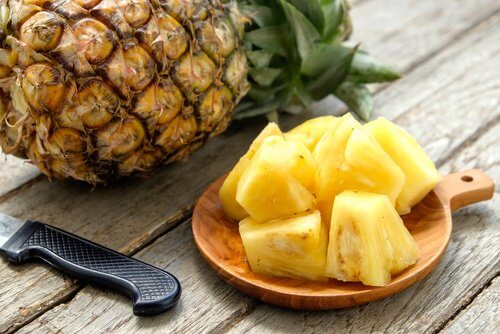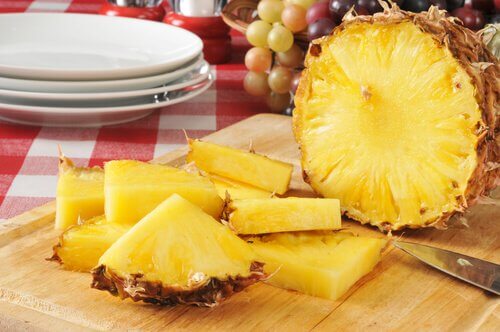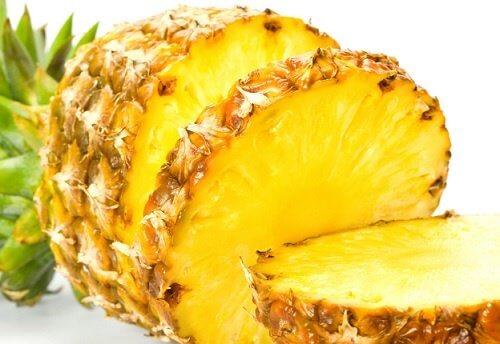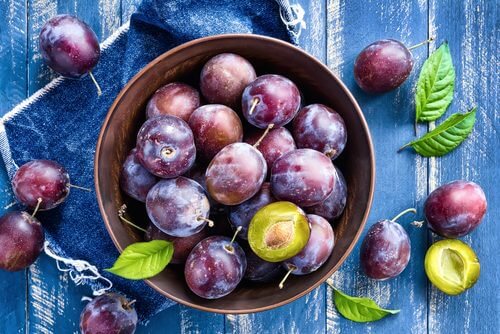How To Prepare Pineapple To Relieve Constipation

Our current diet barely meets all of our body’s needs. Excessive flour consumption and sedentary lifestyles make it difficult for the intestines to defecate waste as they should. If you have this problem, we recommend you read the following article. In it, we share you how to prepare pineapple to relieve constipation.
The great properties of pineapple

Pineapple isn’t just a delicious and refreshing fruit, perfect for hot summer days. It also has many properties that are worth highlighting:
- Firstly, it’s ideal for fat burning. For this reason, it’s recommended for people suffering from obesity, excess weight, and cellulitis.
- As a powerful anti-inflammatory, it’s very good for patients with arthritis or gout.
- Pineapple is also a diuretic due to its potassium contents. It helps eliminate bloating and purifies and detoxifies the body.
- It strengthens the immune system.
- Pineapple promotes the absorption of iron (it’s highly recommended for people with anemia).
- It has an anticoagulant effect (it prevents the formation of blood clots and circulatory problems).
- Pineapple also regulates blood pressure (especially in people with hypertension), fights colds, and reduces the symptoms of rheumatism.
Read more here: 7 Diuretic Foods You Might Want to Add to Your Diet
The benefits of pineapple for constipation
Millions of people suffer from constipation due to their diet or lack of daily exercise. Infrequent bowel movements or difficulty eliminating feces can be relieved by varying our diet more, changing our sedentary lifestyles, and drinking 2 liters of water a day.
Aside from all of this, we can also take advantage of the marvelous benefits of pineapple. Thanks to its star component, bromelain, it improves digestion in general and helps the intestines work flawlessly. We should also highlight the dietary fiber it contains which helps maintain the regularity of bowel movements.
If you suffer from constipation, you should eat a cup of cubed pineapple each day. If this is something you suffer from regularly, it’d be good to eat this fruit several times a week. That way, you can ensure more regular bowel movements.

In addition, you can drink pineapple juice as long as it’s natural (industrial juices don’t count because they contain added preservatives and sugar).
A glass of this juice (250 ml) provides 0.5 grams of fiber. So, if the constipation is acute, it’s advisable to drink 8 glasses (approximately a liter and a half) in one day.
If the constipation is mild (which can happen, for example, if we go on holiday or change our diet), we can drink one glass of pineapple juice each day on an empty stomach and follow it with a glass of water (200 ml).
For children, it’s recommended to mix half a glass of juice with half a glass of water. It’s always convenient to have a juicer at home so that you can prepare it and drink it immediately.
While pineapple is nutritious and beneficial, it does have some counter-indications:
- For example, it can cause dehydration (this is why it should always be consumed with water).
- For people who suffer from gastroesophageal reflux, pineapple juice could make the symptoms worse.
Other fruits to fight constipation
So we don’t get bored of always eating pineapple or if we don’t like it or can’t get hold of it at the market, there are other alternatives that are also effective. We can include them in our diet as a dessert, snack, or as part of breakfast. However, it’s always best to eat them on an empty stomach when we have constipation.
1. Berries
Berries are a great source of fiber: a cup of strawberries (150 g) provides 2.9 grams and a cup of cranberries provides 3.6 grams. Blackberries and raspberries are the richest in fiber, with 8 grams per cup.
To maintain healthy intestinal function, it’s recommended to consume between 20 and 30 grams of fiber a day. So, starting the day with a portion of berries puts you on the right path to reaching this amount. They are also low in calories, hydrate, and protect the body from free radicals.
2. Plums
To deal with constipation, our mothers and grandmothers made us eat these delicious fruits. Plums improve intestinal movements and have a lot of fiber. You can eat them after lunch or dinner as a dessert or drink plum juice.

3. Apples
These are one of the healthiest fruits that exist because they provide a good dose of nutrients. Apples improve the digestive system in general and relieve constipation thanks to the pectin (a type of fiber) they contain. They also fight inflammation.
4. Kiwi
Kiwi is another delicious fruit full of fiber. It also contains an enzyme called actinidain that helps the intestines get going and prevents the formation of gases.
You should eat fresh kiwi in the mornings on an empty stomach. You can also prepare a smoothie with other fruits if you don’t like the mildly acidic taste.
5. Pears
You can typically find pear recipes in anti-constipation recipe books. You can harvest pears all year round. As well as helping to relieve this problem thanks to their pectin contents, they also strengthen the immune system and regulate blood pressure.
All cited sources were thoroughly reviewed by our team to ensure their quality, reliability, currency, and validity. The bibliography of this article was considered reliable and of academic or scientific accuracy.
- Bautista-Casasnovas, A. L. (2011). Estreñimiento. Anales de Pediatria Continuada. https://doi.org/10.1016/S1696-2818(11)70030-0
- Daza, W., Mora, D., & Dadán, S. (2013). Estreñimiento crónico. Gastroenterología Pediátrica. https://doi.org/10.1114/1.1408926
- Montiglioni, V. S., & Soledad, V. (2014). Ananás cumusus: algo más que un fruto delicioso. Instname:Universidad FASTA.
This text is provided for informational purposes only and does not replace consultation with a professional. If in doubt, consult your specialist.








